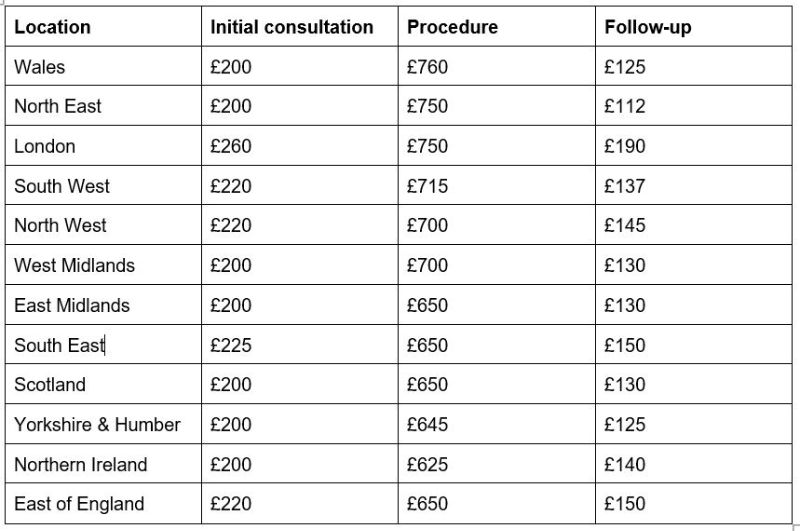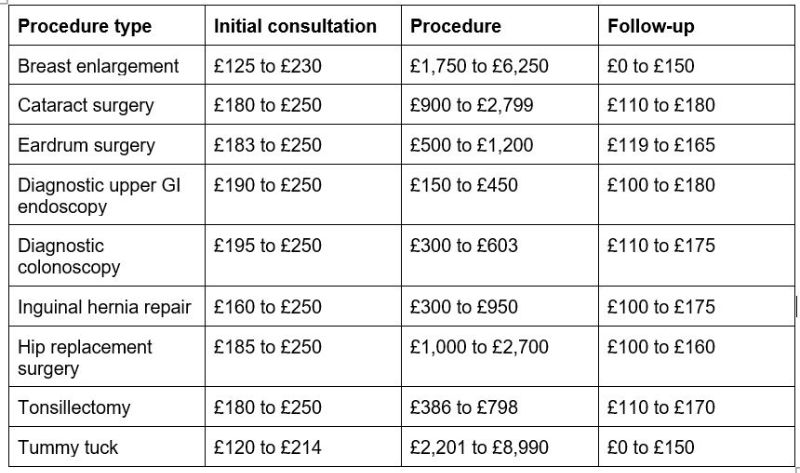If you’re looking for private healthcare, cost is an essential consideration. If you want to pay directly (self-pay), you’ll need to know exactly how much you must pay to access the care you deserve. This guide explains what costs you can expect in terms of your private consultant fees (please note there will be additional costs from the hospital that you are treated at). We’ll also describe how to use our helpful cost calculator to help you roughly work out your estimated consultant costs.
What costs can I expect when going private?
If you’re new to private healthcare, you might not know what you do and don’t have to pay. Complicated procedures can be expensive, so knowing what to expect when opting for private care is worth knowing from the start.
Unless their fees are covered under a hospital 'package price' then you will have to pay the consultant who treats you.
Generally, your private consultant will charge for:
- An initial consultation
- The procedure itself
- Follow-up consultations
The above fees do not include private hospital costs and anaesthetist fees, so it’s essential to know what they include precisely and to find out more about the additional costs you'll need to pay.
To find out more about fees, view the consultant or hospital’s profile on PHIN and contact them for confirmation.
Most consultants with profiles on our website display their typical fee information. However, you can use our interactive calculator if the fees aren’t available or you want to compare them to other consultants’ prices in the same or different areas.
Our private consultant cost calculator (see below) improves your understanding of the potential fees your chosen consultant charges and the hospital, depending on your procedure.
We also have a detailed guide – ‘What (self-pay and insured) patients should know about private consultants' fees’ – with information on the fees that consultants may charge and any unexpected costs that might occur.
Consultant fees for private healthcare calculator
Our consultant fee calculator is easy to use and offers quick insights into what you might pay the consultant for your procedure. Using our filters allows you to:
- Choose a specific procedure
- Select your region
- Sort your results by the initial consultation price, procedure and follow-up fee
We also update our calculator information regularly so you can be sure the prices are relevant and current for your procedure and region.
Discover the calculator for yourself below to see the costs you can expect when choosing a private consultant.
Self-pay price guide: PHIN’s unique private consultant cost calculator
We based our private consultant calculator on up-to-date data from the consultants listed on our site so you can be sure you’re seeing a reasonably accurate guide to what you’ll pay.
To simplify self-pay, we’ve created our unique private consultant cost calculator that allows you to see just how much you could pay.
We’ve pulled information from our consultant profiles to provide the typical fee for:
- An initial consultation
- Your procedure
- Any follow-up appointments
Using our consultant cost calculator, simply choose your procedure from the drop-down menu. Then filter by region and sort your results by procedure, initial and follow-up fees. Finally, you can compare your consultant’s fees with the average of all consultants in your region.
Average fees for private consultants
Here are some of the average fees for procedures across the UK:

We pulled these costs directly from our calculator so you can see a breakdown, including the typical fee range and the average fee. However, it’s crucial to remember that the prices will vary depending on the consultant, procedure type and location you choose.
Average procedure prices
Let’s take a deeper look at the prices involved for some common procedures:

As you can see, each procedure has price fluctuations. How much the fees will be will depend on your consultant’s location and the procedure. These differences show why using our calculator can be useful, as it helps you anticipate the expected costs.
Find your private consultant with PHIN
Accessing private healthcare is simpler when you use PHIN’s easy-to-use search tool (on the home page). With our help, you can explore consultant profiles and use our cost calculator to ensure you’re informed and ready to begin your journey of self-pay private healthcare.
Find your private consultant with PHIN and take your health into your own hands.
